More than nine-in-ten Poles see Russia as a major threat and have no confidence at all in Putin

This Pew Research Center analysis focuses on public opinion in Poland. Polish views of Russia, NATO and the European Union are examined in the context of long-term trend data. The report also explores Poland’s own role in Europe and the world. This report draws on a nationally representative survey of 1,043 adults from March 25 to May 5, 2022. The survey was conducted face to face in Poland.
Here are the questions used for the report, along with responses, and the survey methodology.
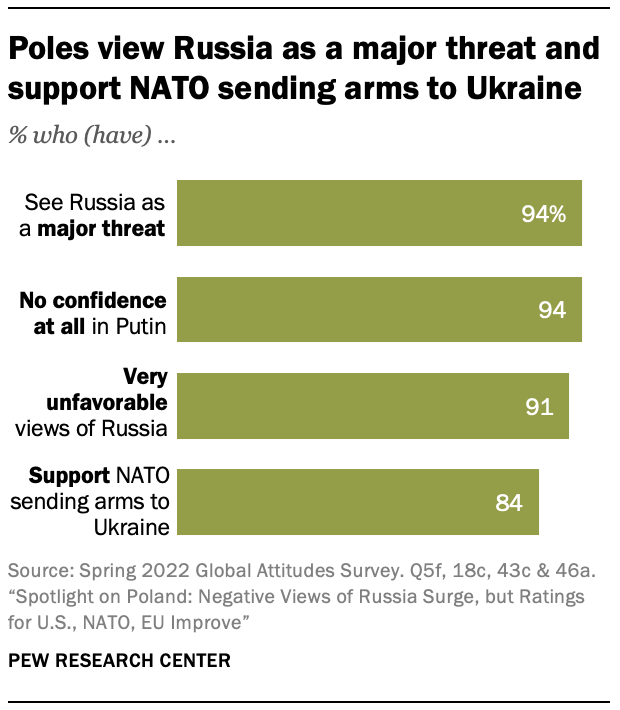
The Russian invasion of Ukraine has led to a dramatic shift in attitudes in Poland, a key European partner and one which only three decades ago was part of the former Soviet Union’s Eastern Bloc. Negative attitudes among Poles towards Russia are at all-time highs since Pew Research Center began tracking opinion on this question in 2007, with virtually unanimous negative opinions of the Russian state. Currently, 94% see Russia as a major threat, up from 65% who said this in 2018, and 94% have no confidence at all in Russian President Vladimir Putin – also an all-time high.
The sharp decline in positive attitudes toward Russia has benefited Poland’s western allies, specifically the United States, the North Atlantic Treaty Organization (NATO) and the European Union (Poland is a member of both NATO and the EU). Around nine-in-ten Poles have a favorable view of the U.S., NATO and the EU, all of which represent the highest shares since 2007.
In terms of Poland’s relationship with the U.S., the increase in favorable attitudes toward America coincides with a strong 82% confidence rating for U.S. President Joe Biden, a marked increase from the 51% who had confidence in former President Donald Trump in 2019. In addition, roughly two-thirds in Poland see having a close relationship with the U.S. as more important than having one with Russia. Only 1% want a closer relationship with Russia, while 28% volunteer that both are equally important. Just three years ago, more than half of Poles (53%) offered that both relationships are equally important.
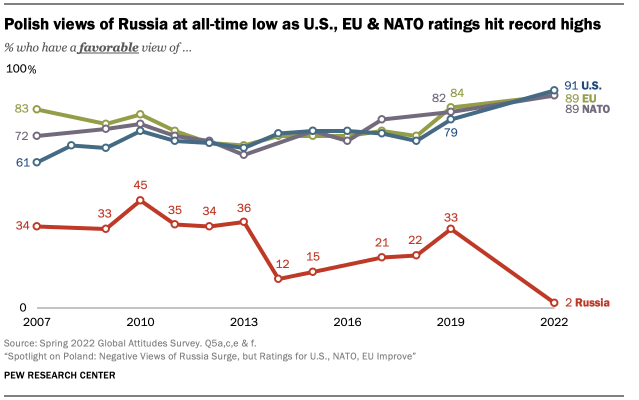
The shift in attitudes also benefits Polish views of the NATO alliance. Roughly nine-in-ten Poles have a favorable view of NATO, including 34% with very favorable opinions of the military alliance. Currently, 84% of Poles support arming Ukraine through NATO and 75% want Ukraine to become a NATO member, a substantial increase in support since 2015. In addition, roughly two-thirds in Poland say they would support their country using military force to defend a NATO ally from a hypothetical Russian military action, and about the same share say the U.S. would defend that NATO ally. This support for military action in the event of a Russian attack on a NATO ally is up a considerable amount since the question was last asked in 2019.
Another clear beneficiary of the decline in ratings for Russia is the EU: It has received its highest rating in Poland (89%) since Pew Research Center began asking the question in 2007. And Poles are now much more likely than they were in 2018 to say that the EU understands the needs of Polish citizens and promotes democratic values, prosperity and peace. Fewer now also say that the EU is intrusive or inefficient. A majority (57%) says that the economic integration of Europe has strengthened the Polish economy.
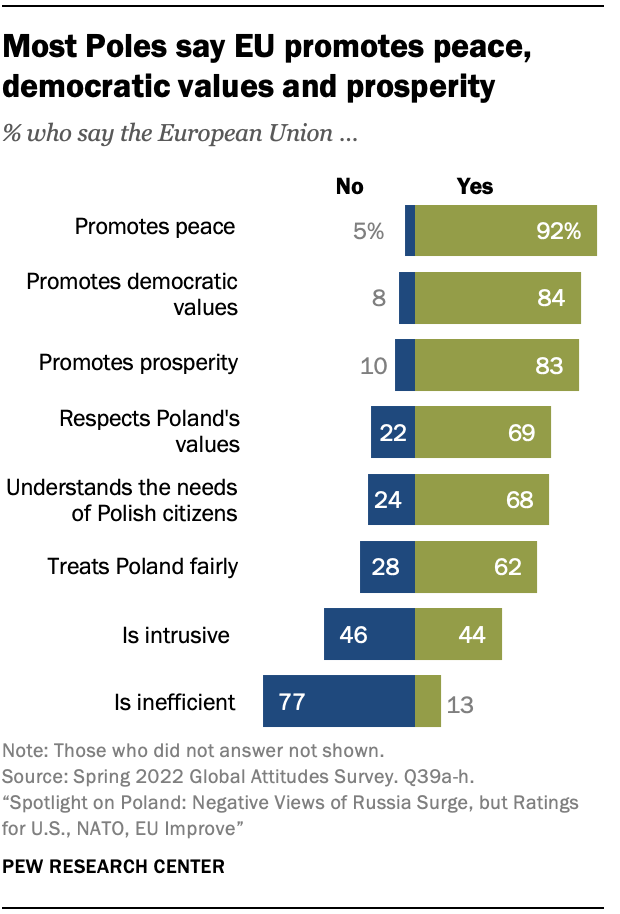
More than three million Ukrainians have fled to Poland since Russia’s invasion, and eight-in-ten Poles now support taking refugees from countries where people are fleeing violence and war, up from 49% who held that view in 2018.
These are among the major findings of a Pew Research Center nationally representative survey of Poland, conducted from March 25 to May 5, 2022, among 1,043 people. Interviews were conducted face to face in people’s homes and the data is weighted to reflect the overall demographic composition of Poland. This report coincides with a larger survey of 18 countries on attitudes toward the U.S., Russia and NATO.
Additional findings include:
- Attitudes toward Russia are negative across all demographic groups, but attitudes toward the U.S. and the EU are more favorable among Poles ages 18 to 29. Over half of 18- to 29-year-olds have a very favorable view of both the U.S. and the EU, compared with only about two-in-ten among Poles 65 and older.
- Similarly, younger Poles are much more likely than their older counterparts to say that the EU understands the needs of Polish citizens and that the EU is not intrusive.
- Politically, there are divides on attitudes toward the EU among supporters and nonsupporters of the governing Law and Justice Party (PiS). Generally, those who hold an unfavorable view of Law and Justice tend to see the EU in a much more favorable light and say the EU promotes prosperity and respects Polish values. On the other hand, those who support PiS are much less likely to express positive opinions about the EU. Still, attitudes towards Russia and Putin are equally negative among both PiS supporters and nonsupporters.
As critical views of Russia, Putin reach new highs, Poles turn to U.S.
Polish views of Russia are more critical than ever, with nearly all Poles (97%) holding an unfavorable view of the country, including 91% who have a very unfavorable view. The share who hold a very negative view of Russia has increased by 67 percentage points since the question was last asked in 2019.
Poles express equally unfavorable views of Russia regardless of age, level of education or ideology. Apprehension about Russia’s power and influence has tracked in the same direction. While 65% said Russia’s power and influence posed a major threat to Poland in 2017 and 2018, 94% now hold this view – an increase of 29 percentage points.
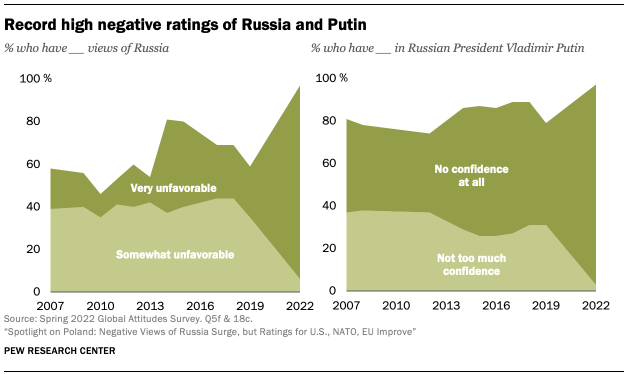
Distrust in Russia’s president has likewise reached new highs. Almost all Poles say they have little or no confidence in Putin (97%), including 94% who have no confidence at all. The degree of distrust has also increased dramatically since 2019, when nearly a third of Poles (31%) had not too much confidence in Putin. Now, virtually every Pole has no confidence at all in the Russian leader.
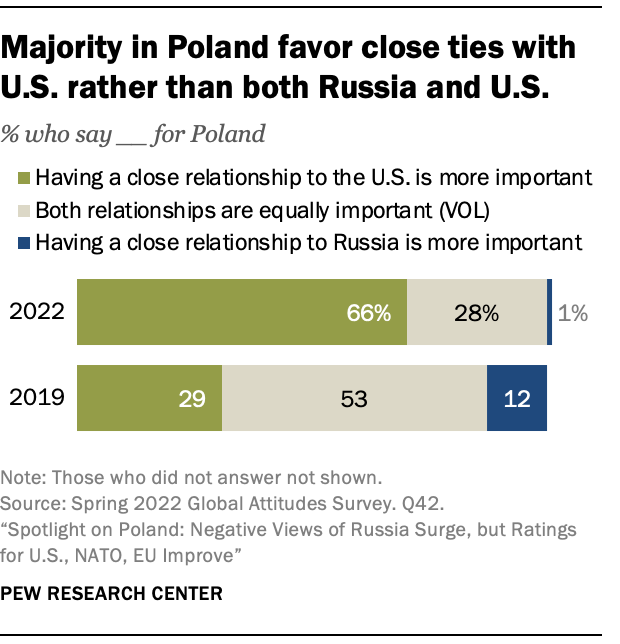
Alongside this increasing wariness of Russia and Putin, Poles favor a closer relationship with the U.S. About two-thirds in Poland now say having a close relationship to the U.S. is more important than having a close relationship to Russia or to both countries. Roughly three-in-ten consider both relationships equally important, and just 1% prefer prioritizing the relationship with Russia. In 2019, about half of Poles (53%) were more willing to volunteer that close relationships with both the U.S. and Russia were equally important.
Younger Poles are particularly likely to say a close relationship with the U.S. is more important. While 74% of adults under age 30 say having a close relationship to the U.S. is more important, 63% of those 65 and older say the same.
In Poland, high levels of support for taking in refugees, arming Ukraine through NATO
Poles increasingly support their country taking in refugees from countries where people are fleeing violence and war. Eight-in-ten now approve of Poland admitting such refugees, which is a 31 percentage point increase from 2018.
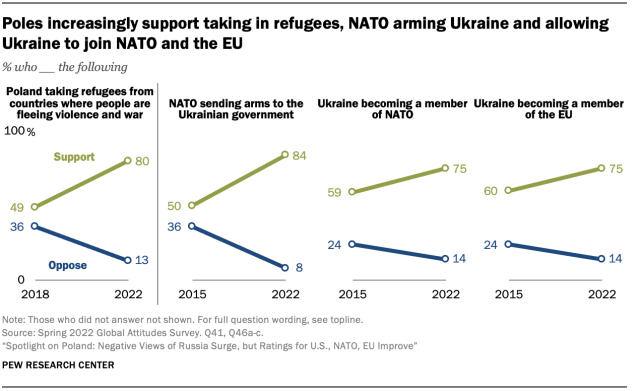
More than eight-in-ten also say they support NATO sending arms to the Ukrainian government in response to the situation involving Russia and Ukraine. In 2015, only half in Poland approved of NATO arming the Ukrainian government to defend itself against Russia. Support for Ukraine joining NATO and the EU has similarly increased by double digits from about six-in-ten to 75% since 2015 (a year after Russia’s annexation of Crimea, which few countries have recognized, and its initial invasion of the Donbas region of Ukraine).
When asked about a hypothetical military conflict between Russia and a neighboring NATO ally, 65% of people in Poland say their country should use military force to defend that neighbor, 15% reject the use of military force and 19% do not provide an answer. This is an increase of 25 points from 2019 (40% said they supported using military force then) and a return to levels of support last seen in 2017 (62%). Men are more likely than women to say that Poland should defend the neighbor using military force, as are Poles with unfavorable views of the governing Law and Justice party compared with those with favorable views of PiS.
Poles are also optimistic that the U.S. would step in if a neighboring NATO ally was in a military conflict with Russia. Roughly two-thirds (66%) believe the U.S. would use military force to defend the neighboring ally. Optimism about U.S. intervention on behalf of a NATO ally has increased by 19 points since 2019 and is the highest recorded since the question was first asked in 2015. Views on U.S. military intervention are similar among both men and women and those with differing views of Law and Justice.
Polish opinions of the European Union are increasingly positive
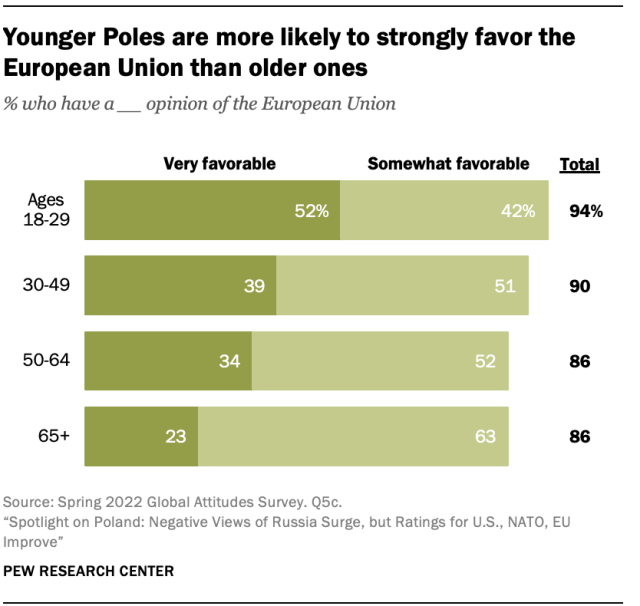
Nearly nine-in-ten Poles (89%) have a favorable view of the European Union, the highest rating since the Center began asking this question in 2007. The intensity of these positive views has also increased to record highs; 37% have a very favorable opinion of the organization.
While overall favorability is high across age groups, the degree of support varies widely. Young Poles – those ages 18 to 29 – are particularly likely to have very favorable views of the EU (52%). Only around a quarter of those ages 65 and older offer the same very favorable ratings.
The concentration of favorable views also varies between those who support the governing Law and Justice party and those who do not. Nearly all (94%) Poles with unfavorable views of PiS have a positive opinion of the EU, including 46% who have very favorable views. While 83% of PiS supporters also have favorable opinions of the EU, just 27% are very favorable.
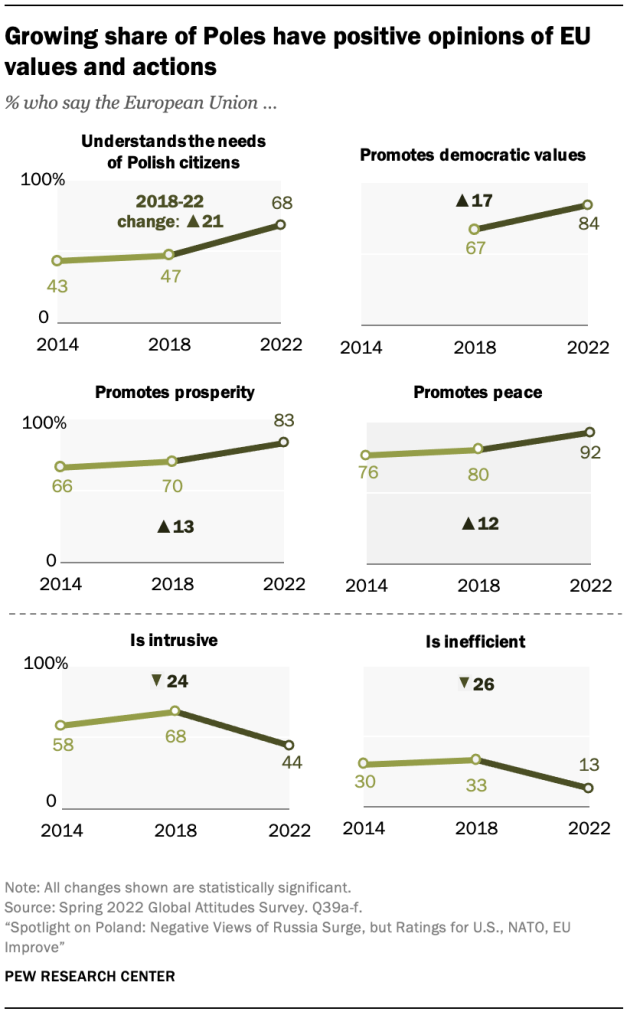
Polish opinion of the EU is also climbing on more specific characteristics. Large majorities of Poles say the EU promotes peace, democratic values and prosperity. Smaller but still substantial majorities say the EU respects Poland’s values (69%), understands the needs of Polish citizens (68%) and treats Poland fairly (62%). These ratings have risen significantly since 2018 on each item for which trend data is available. Conversely, decreasing shares call the EU intrusive or inefficient.
As with general favorability towards the European Union, ratings on specific characteristics differ greatly by partisanship. Poles with favorable views of Law and Justice are more critical of the EU, particularly on items that address the organization’s relationship with Poland. Fewer than half of PiS supporters say the EU treats Poland fairly, respects Poland’s values or understands the needs of Polish citizens while around eight-in-ten or more of those with unfavorable views of PiS hold those opinions. On more general items – such as whether or not the EU promotes prosperity or democratic values – PiS supporters are still more critical than their counterparts, though to a lesser degree.
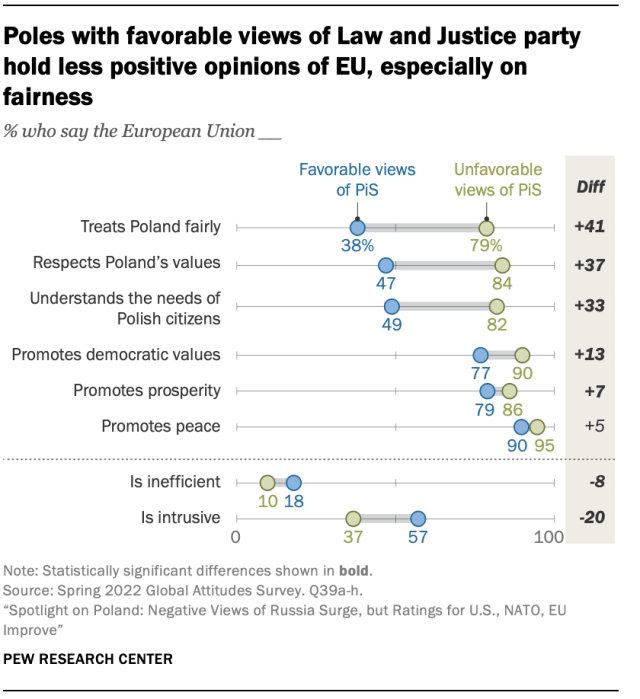
Following the same trend, those who hold favorable opinions of Law and Justice are more likely to call the EU intrusive and inefficient than those who do not favor the governing party.
When asked to evaluate Poland’s economy since the economic integration of Europe, 57% say it has become stronger, a significant decrease from the 71% who shared the same view in 2019. This drop is driven largely by those with unfavorable opinions of Law and Justice. In 2019, 71% of Poles believed the economy had strengthened regardless of support for PiS. Now, 69% of Poles with favorable views of PiS say the economy has strengthened, while just 52% of those with unfavorable views of the governing party say the same.
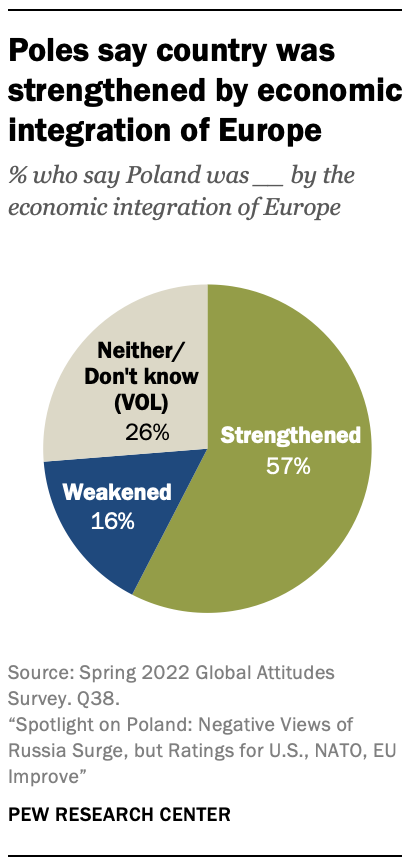
Views of economic integration also relate to current ratings of Poland’s economy at large. Today, just 46% of Poles say their overall economic situation is good, also a significant decrease from 2019 when positive ratings stood at 74%. Nearly seven-in-ten (68%) of those who offer a positive evaluation of their economy also think it benefited from the economic integration of Europe, while fewer than half (49%) of those who say the economy is bad agree.
While Poles, on balance, say their economy has strengthened, they do not say the same for their country’s influence in the world. Nearly half (49%) say Poland’s influence has stayed about the same in recent years. About a third (34%) say it has gotten stronger and another 12% say it is weaker. Like partisan patterns on views of the economic integration of Europe, supporters of the governing party are significantly more likely to say Poland’s influence is getting stronger than those with unfavorable opinions of Law and Justice (45% vs. 27% respectively).


